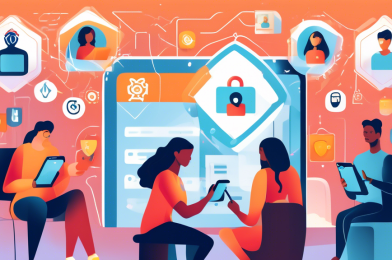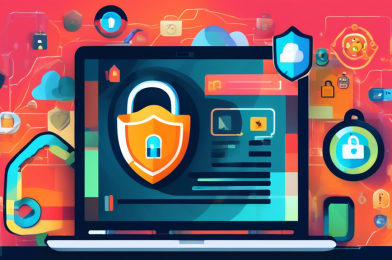Top Strategies for the Best Online Privacy Protection
In today’s digital age, safeguarding your personal information has never been more crucial. With cyber threats evolving rapidly, it’s important to stay ahead of the curve and adopt measures that ensure the best online privacy protection. This article outlines top strategies that can help you secure your digital footprint effectively. By implementing strong authentication methods, utilizing privacy-focused tools, and staying informed about privacy policies and potential data breaches, you can achieve a higher level of online security and peace of mind. Let’s delve into these strategies to understand how you can enhance your online privacy protection.
Implement Strong Authentication Methods
In today’s digital age, ensuring the security of your online presence is paramount. One of the most effective strategies for achieving the best online privacy protection is by implementing strong authentication methods. The use of robust authentication techniques not only secures your personal information but also deters unauthorized access.
Understanding Two-Factor Authentication (2FA) and Multi-Factor Authentication (MFA)
Two-factor authentication (2FA) and multi-factor authentication (MFA) are essential components of strong authentication methods. 2FA requires users to provide two different types of identification before accessing their accounts, typically something they know (a password) and something they have (a smartphone or security token). This additional layer significantly reduces the risk of unauthorized access, as potential intruders would need both factors to gain entry.
MFA expands on this concept by incorporating more than two forms of identification. It might include something you know (password), something you have (security token or smartphone), and something you are (biometric verification, such as a fingerprint or facial recognition). The combination of multiple authentication factors provides exceptional protection for your online accounts and sensitive information.
The Role of Strong Passwords and Biometric Verification
Creating strong, unique passwords for each of your accounts is crucial for maintaining online privacy. A strong password should be lengthy, contain a mix of uppercase and lowercase letters, numbers, and symbols, and exclude easily guessable information such as birthdates or common words. Using a password manager can aid in generating and securely storing complex passwords, ensuring that each of your accounts has optimal protection.
Biometric verification adds another layer of security. Unlike passwords, which can be forgotten or compromised, biometric data such as fingerprints, facial recognition, and iris scans are unique to each individual and difficult to replicate. Incorporating biometric verification with strong passwords forms a formidable barrier against unauthorized access, significantly enhancing your online privacy.
Best Practices for Setting Up Secure Authentication
To maximize the benefits of best online privacy protection through robust authentication, follow these best practices when setting up your authentication methods:
- Enable Two-Factor or Multi-Factor Authentication: Wherever possible, activate 2FA or MFA on your accounts. This additional security measure can prevent unauthorized access even if your password is compromised.
- Use Strong, Unique Passwords: Avoid using the same password across multiple accounts. Instead, generate unique passwords for each account and use a password manager to keep track of them.
- Opt for Biometric Verification: Where available, enable biometric verification as an extra layer of security. Methods such as fingerprint scanning and facial recognition are highly effective in preventing unauthorized access.
- Regularly Update Passwords: Change your passwords periodically to minimize the risk of potential breaches. Regular updates ensure that even if an old password is compromised, it will no longer be valid.
- Be Wary of Phishing Attempts: Cybercriminals often use phishing to gain access to personal information. Always verify the source of emails and messages that request sensitive information before responding.
Implementing strong authentication methods is a critical step in protecting your online privacy. By using robust techniques such as 2FA, MFA, strong passwords, and biometric verification, you can significantly reduce the risk of unauthorized access and keep your personal information secure. Embracing these best practices will ensure that your online interactions remain private and protected.
Utilize Privacy-Focused Tools and Software
In an age where personal data is a hot commodity, employing the best online privacy protection tools and software is essential for safeguarding your digital footprint. Leveraging advanced technologies like virtual private networks (VPNs), encrypted messaging apps, privacy-focused browsers, and search engines can drastically reduce your vulnerability to cyber threats. Here’s a closer look at some invaluable resources that ensure you have the best online privacy protection.
Overview of Virtual Private Networks (VPNs) and Encrypted Messaging Apps
Virtual private networks (VPNs) are among the most effective tools for maintaining online privacy. A VPN masks your IP address and encrypts your internet connection, making it exceedingly difficult for hackers, advertisers, or even your internet service provider to track your online activities. By routing your connection through a secure server, VPNs provide an additional layer of security against data breaches and unauthorized access.
Encrypted messaging apps add another dimension of privacy, ensuring that your communications remain private. These apps use end-to-end encryption, which means that only you and the recipient can read the messages. Popular options such as Signal and WhatsApp have become essential for those looking to maintain secure and confidential conversations.
Benefits of Using Privacy-Focused Browsers and Search Engines
Traditional browsers and search engines often track your activities and store your personal information for targeted advertising and data mining. In contrast, privacy-focused browsers like Brave and Mozilla Firefox offer enhanced security features and block tracking cookies and advertising scripts. These tools help preserve your anonymity and offer a safer browsing experience.
Additionally, search engines like DuckDuckGo are designed to respect user privacy by not tracking your search history or personalizing search results based on your activity. Using such platforms ensures that your queries and internet behavior remain confidential, contributing to the best online privacy protection.
Recommended Tools and Software for Optimal Online Privacy Protection
To achieve the best online privacy protection, it’s crucial to use a combination of the most effective tools and software available. Here’s a list of recommended options:
- ExpressVPN: Known for its robust encryption protocols and high-speed servers, ExpressVPN is a top choice for maintaining secure and private internet connections.
- NordVPN: This tool offers double data encryption and a strict no-logs policy, making it a highly reliable option for safeguarding online activities.
- Signal: Renowned for its state-of-the-art encryption, Signal provides the best possible confidentiality for your messages and calls, ensuring they remain private between you and the recipient.
- ProtonMail: An encrypted email service that prides itself on security, ProtonMail prevents unauthorized access and ensures that your correspondence stays private.
- Brave Browser: Boasting built-in ad-blocking and anti-tracking features, Brave offers a seamless and secure browsing experience free from intrusive trackers and ads.
- DuckDuckGo: As a search engine that doesn’t track your search history, DuckDuckGo ensures that your searches stay private, contributing to a more secure online environment.
Incorporating these tools into your digital life will significantly enhance your online privacy, offering comprehensive protection against various cyber threats.
In conclusion, utilizing the best online privacy protection tools and software is not just a recommendation; it’s a necessity in today’s digital world. By integrating VPNs, encrypted messaging apps, privacy-focused browsers, and search engines into your daily routine, you can create a formidable defense against privacy invasion and data breaches. The tools and software discussed above provide robust, proven solutions that prioritize your privacy and security, ensuring that your online experience remains private and protected.
Stay Informed About Privacy Policies and Data Breaches
The Importance of Reading and Understanding Privacy Policies on Websites and Apps
In today’s digital age, being aware of how your data is being utilized is crucial for best online privacy protection. Privacy policies on websites and apps provide detailed information about data collection, storage, and sharing practices. They serve as a contract between the user and the service provider, outlining what personal information is collected and how it will be used.
Understanding these policies can help you make informed decisions about which services and platforms you are comfortable engaging with. Many individuals often overlook the fine print, leading to unexpected data usage practices that can compromise privacy. Make it a habit to read and comprehend privacy policies before you sign up for any service. Look for key details such as:
- What data is collected?
- How is the data used?
- Who has access to your data?
- What measures are in place to protect your data?
By thoroughly reviewing these elements, you can better control your personal data and enhance your online privacy protection.
Steps to Take in the Event of a Data Breach
A crucial component of best online privacy protection is knowing how to react if your data is compromised. Data breaches have become increasingly common, affecting millions of users worldwide. If you suspect that your personal information has been exposed, taking immediate action can minimize the impact.
Here are the steps you should take if you experience a data breach:
- Verify the Breach: Confirm if your information has indeed been compromised. Check for notifications from the affected service or use websites like Have I Been Pwned to see if your email address or other details appear in any known breaches.
- Change Passwords Immediately: Update your passwords for the affected accounts and any other services where you’ve used the same credentials. Utilize strong, unique passwords for each account to prevent further access.
- Enable Two-Factor Authentication (2FA): Strengthen your account security by activating 2FA on services that offer it, adding an extra layer of protection.
- Monitor Bank and Credit Accounts: Keep a close watch on financial statements for any suspicious activities. Consider placing a fraud alert on your credit reports.
- Seek Professional Assistance: If the breach is severe, consider contacting a professional who specializes in cybersecurity for further guidance on protecting your data.
Acting swiftly can significantly reduce the risks associated with data breaches, securing best online privacy protection for you.
Tips for Staying Updated on the Latest Privacy Protection Trends and News
Keeping abreast of the latest developments in the field of online privacy is essential for maintaining the best online privacy protection. Technology and regulations surrounding data privacy are continuously evolving, and staying informed helps you adapt to new threats and solutions.
Here are some effective ways to stay updated:
- Follow Reputable Privacy Blogs: Subscribe to blogs and websites that specialize in online privacy and data protection. Examples include the Electronic Frontier Foundation (EFF) and Privacy International.
- Join Privacy-Focused Communities: Participate in forums and groups dedicated to online privacy. Platforms like Reddit have several communities where experts and users share insights and news.
- Set Up Google Alerts: Use Google Alerts to receive notifications about the latest news and articles related to online privacy. Customize your alerts using relevant keywords.
- Attend Webinars and Conferences: Virtual events and conferences on cybersecurity and privacy can be great sources of up-to-date information and best practices.
- Regularly Review Privacy Settings: Platforms and apps often update their privacy settings and policies. Make it a routine to review and adjust these settings to ensure they align with your privacy preferences.
By diligently staying informed, you can proactively protect your online privacy and stay one step ahead of potential threats.
Remember, best online privacy protection isn’t a one-time task but an ongoing process requiring vigilance and informed decisions.
Conclusion
Achieving the best online privacy protection requires a multifaceted approach. By implementing robust authentication methods, you can significantly reduce the risk of unauthorized access to your personal information. Utilizing privacy-focused tools and software, such as VPNs and encrypted messaging apps, enhances your ability to maintain privacy in your digital interactions. Moreover, staying informed about privacy policies and data breaches is crucial for maintaining a proactive stance in safeguarding your data.
The strategies outlined in this article provide a comprehensive framework for anyone looking to protect their online privacy. Following these best practices not only helps in preventing potential data breaches and unauthorized access but also reinforces the importance of privacy in the digital age. Remember, the best online privacy protection starts with informed, deliberate actions.









